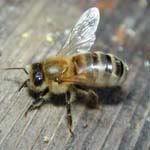
The Independent:
Spiegel Online:The theory is that radiation from mobile phones interferes with bees' navigation systems, preventing the famously homeloving species from finding their way back to their hives. Improbable as it may seem, there is now evidence to back this up.
Colony Collapse Disorder (CCD) occurs when a hive's inhabitants suddenly disappear, leaving only queens, eggs and a few immature workers, like so many apian Mary Celestes. The vanished bees are never found, but thought to die singly far from home. The parasites, wildlife and other bees that normally raid the honey and pollen left behind when a colony dies, refuse to go anywhere near the abandoned hives.
The alarm was first sounded last autumn, but has now hit half of all American states. The West Coast is thought to have lost 60 per cent of its commercial bee population, with 70 per cent missing on the East Coast.
CCD has since spread to Germany, Switzerland, Spain, Portugal, Italy and Greece. And last week John Chapple, one of London's biggest bee-keepers, announced that 23 of his 40 hives have been abruptly abandoned.
Other apiarists have recorded losses in Scotland, Wales and north-west England, but the Department of the Environment, Food and Rural Affairs insisted: "There is absolutely no evidence of CCD in the UK."
Physicist Jochen Kuhn and his colleagues in Landau have studied the influence of high-frequency radiation on bee populations for years. In two pilot studies -- the latest one came out in 2006 -- the researchers just wanted to learn if there was any potentially bad effect at all. They arrived at a cautious conclusion, namely that bees exposed to strong radiation had a harder time flying back to their hives than unexposed bees. "Honeycomb area and mass showed a disadvantageous trend for the radiated bees," said Kuhn in an interview with SPIEGEL ONLINE, "with no statistical significance."
Mobile vs. cordless phones
High-frequency radiation? Electromagnetic waves emitted by mobile-phone towers are high-frequency radiation. But that alone can't explain the bee deaths, because Kuhn's team used a base station for DECT telephones as a radiation source -- and DECT (Digital Enhanced Cordless Telecommunications) signals are used for cordless phones at home, not for mobile phones. "DECT and GSM (for mobile phones) use a number of different frequencies and a number of different modulation- and pulse-processes," Kuhn says. "We still don't know whether these (signals) have even a potential effect on bees. And, if they do, we don't know which ones.[snip] Basically they stuffed a DECT base station inside the hive, exposing the bees to an extreme not-found-in-nature radiation level.
The debate over the causes of bee deaths on both sides of the Atlantic has focused on a number of suspects:
[snip]
- The American "Colony Collapse Disorder Working Group" has discussed something called "the AIDS of the bee industry." But it's not clear to anyone whether the busy insects might be suffering from a new, unknown sexual infection or a known one.
- Bacteria from genetically modified crops could affect the bees' intestinal surfaces and make them vulnerable, according to Hans Hinrich Kaatz from the University of Halle, in an interview with SPIEGEL ONLINE.
- Manfred Hederer, President of the German Beekeepers Association, told SPIEGEL that he believed the bees were dying from "some kind of poison, a certain active agent, which we have not discovered."
- Climate change is also on the list. Global warming has changed growth and blossoming periods of plants in many parts of the world, which in turn can influence animals.
- And now "mobile phone radiation" should be added to the list, or -- as The Scotsman put it over the weekend -- "emissions from mobile phone towers."
One last theory: Overcultivation
Jürgen Tautz, a bee researcher at the University of Würzburg, is sceptical about the mobile-phone theory but still calls it "worth researching." It's known, he says, that honeybees are "react with extreme sensitivity to changes in the earth's magnetic field." Tautz plans to let a working group he's organized study the question of whether some unpleasant interaction might exist between radio networks and honeycombs.
But it's still a matter of debate whether the bees are healthy and unstressed. Professional beekeepers have warned for years about rising problems in their colonies:
- Varroa mite disease, from Asia, with the discouraging Latin name varroa destructor, has threatened European bee populations for over 20 years.
- Because farmers spray wildflowers as weeds and prefer monoculture -- planting the same crops year after year on a given plot of land -- the bees' range of nutritional food has shrunk.
- Beekeepers also list the introduction of so-called green genetic engineering as a potential problem. But the actual acreage of these open-air experiments in Germany represents less than 0.1 percent of the nation's total cultivated area.
Another explanation -- one not unknown among apiarists -- may be even more important. Tautz believes that intensive beekeeping may itself be one of the main problems. Raising dense colonies of bees narrows the genetic pool for a population, and less genetic variation weakens any species. In Turkey, where bees haven't been cultivated as intensely as they have in Germany, for example, mass deaths like the ones observed now in Europe and the United States would be unimaginable.

Update: John Blatchford has a good overview of what is going on in the United States and Europe and offers a discussion thread.
Update: Christy Hardin Smith of Firedoglake has more.
5 comments:
Thank you! Have updated and linked to you.
IMHO... I just don't buy the cell phone hypothesis.
Why?
First, electromagnetic waves diminish as the square of the distance. The average person not involved in a technical discipline has no idea how very quickly any kind of EM signal diminishes away from its source. Cell phone signals are low-powered compared to broadcast radio... cell phones themselves have to use sophisticated mathematics to drag the tiny signals out of the noise... and we never noticed CCD due to, say, local FM or TV broadcast signals. If this were the cause, there should be a clear pattern of more CCD in colonies nearer to transmission towers. Of course this should be tested, but based on the results you cite in this post, I don't expect to find anything there.
Second, every time there's a new problem, somebody points to power lines or radio transmission towers. Blaming them is a tradition as old as radio and electrical power themselves. For a newer phenomenon like CCD, look for a newer explanation... you have several candidates for such in your list.
Finally, the list of nations suffering CCD does not correspond well (I'm operating from memory here; you'll need to check this) with the list of nations with high rates of cell phone use. (Finland, anyone?)
Plant monoculture, excessive beekeeping with its attendant lack of genetic diversity (a familiar story in other kinds of agriculture, no?), more robust mites, and yes, genetically modified plants all seem more likely causes to me. Of course everything should be studied... but we've been using electricity and radio for ages and understand them pretty well; I think if they were the problem, we'd have nailed it by now.
Thanks, Steve. Your reaction and explanation is very much what my husband's reaction was.
At least this is getting attention... 70% loss of commercial bees is a whole hell of a lot..
ellroon:
Thank you for putting this out there.
Steve:
You are correct about the "usual suspects" point. However, there are a couple of additional aspects that might be worthy of consideration:
1. The frequency of the existing radio broadcast towers was considerably less - and besides the mobile phones the GPS system has been established with even higher frequencies.
2. In the past 10 to 15 years the number of electromagnetic sources multiplied. All the increased number of communication, navigation etc. satellites, mobile radio devices (including mobile phones) add to the cacophony of EM noise - however limited is the individual mobile phone range. Although on that point: a tower covers usually up to about 10 square mile so a phone would need to be able to transmit its own signal to about 1.78 miles. That is not insignificant, considering that the FM transmitter that one can buy for getting the MP3 player play via the car or home stereo has the range of about 30-50 feet (sic!) at the most. Who knows, maybe the bees do not have sophisticated enough mathematics at their disposal to drag whatever they may need from the noise... or, if they are sensitive to any of the affected EM spectrum, it may just be too much noise.
3. I would also argue that we do not have a very good understanding of the inner nature the EM phenomena. Sure, we can use them to satisfy our needs. For the most part they do behave according to the models we use to describe them. Yet, most people do not even have the ability to accurately describe what can be perceived using a prism, which belongs to the observable (with our senses) part of our world. We do have different models in physics to describe electricity - some more mechanistic / materialistic and others more metaphysical in their nature -, but we have to use them separately depending on what aspects, uses, behaviors we want to understand or convey. As for the magnetic phenomena - the available understanding is fairly limited as far as I can see it. Again, we do make use of the magnetic behavior in almost every aspect of technology in modern life, but that does not equal clear understanding of the nature of the phenomenon.
BG
gabor, wow! Thanks for the info.
Basically it comes down to this. We know just enough to do stuff, and don't know just enough to really mess things up.
Sounds about right....
Post a Comment